Ministry of Health and Family Welfare
Regional Open Digital Health Summit 2025 Convenes in New Delhi to Advance Interoperability and GenAI for Global Health
Summit focuses on building resilient digital public infrastructure to transform health systems across the Global South
Union Health Secretary Smt. Punya Salila Srivastava emphasises India’s commitment to inclusive, interoperable and citizen-centric digital health systems
CEO, NHA Dr Sunil Kumar Barnwal highlights responsible adoption of GenAI and the centrality of data quality and interoperability
Posted On:
19 NOV 2025 6:03PM by PIB Delhi
The Regional Open Digital Health Summit 2025 (19th - 20th November 2025) was inaugurated, here today, bringing together policymakers, technologists, public health leaders, and global experts from across the WHO South-East Asia Region (SEAR).
Organized by the National e-Governance Division (NeGD), Ministry of Electronics and IT, in collaboration with the National Health Authority (NHA), Ministry of Health & Family Welfare, WHO-SEARO and UNICEF, the three-day summit aims to accelerate the adoption of open, interoperable, and standards-based digital health ecosystems across the region.
Delivering the Inaugural Address, Smt. Punya Salila Srivastava, Union Health Secretary observed that while countries in the region differ in geography, capacity and scale, they face common challenges of access, affordability, workforce shortages and infrastructural gaps. “Viewed in isolation these challenges appear distinct, but they share a common thread – our region needs connected, citizen-centric health systems that bridge gaps in access and equity to achieve universal health coverage,” she said.
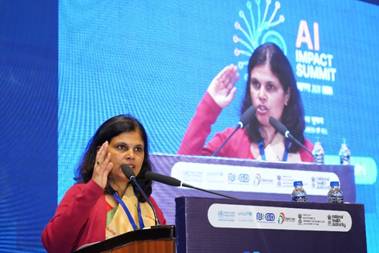
She underscored India’s journey in strengthening its digital health architecture through robust governance, open standards and emerging technologies. Referring to the National Digital Health Blueprint (2019) and the National Health Policy (2017), she noted that “India’s digital health ecosystem is anchored in interoperability, privacy-by-design, and citizen-centricity, with responsible use of GenAI woven into its foundational architecture.”
Highlighting India’s advancements in using GenAI for health, the Union Health Secretary said, “Across the nation, AI-enabled surveillance and diagnostics are helping us identify diseases faster, predict outbreaks earlier and support frontline health workers in the most remote parts of the country.” She pointed to concrete examples, including AI-driven disease surveillance under IDSP, risk prediction for TB, vulnerability mapping, and AI-based screening models for conditions such as diabetic retinopathy, oral cancer and skin diseases.
She emphasised that India’s health workforce is also benefiting from GenAI-powered decision-support tools. “Doctors are core stakeholders in our health system. The Clinical Decision Support System integrated with e-Sanjeevani has supported more than two lakh doctors and improved access to quality care for over twenty crore patients.” She added that similar tools are being promoted in the private sector through the Ayushman Bharat Digital Mission (ABDM).
Reiterating India’s commitment to safe and trustworthy AI, she stated, “As we scale these tools, we remain clear that AI must be transparent, evidence-based and never an opaque black box.”
Calling for collective action, Smt. Srivastava noted, “Digital Public Infrastructure, open standards and responsible GenAI are no longer optional enhancements – they are foundational pillars of resilient and future-ready health systems.” She said that the Summit provides a vital platform for countries to share lessons, harmonize approaches and advance digital health as a regional public good.
Addressing the gathering, Dr. Sunil Kumar Barnwal, CEO, National Health Authority, stressed the need for responsible, contextual and evidence-driven use of Generative AI. He observed, “Generative AI is not a substitute for clinical expertise – it is a multiplier of human capability. But its effectiveness is directly proportional to data quality and interoperability.”
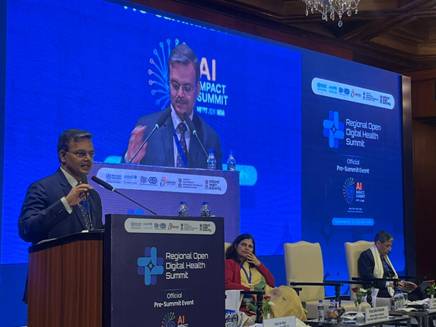
Delivering the Keynote Address on “Emerging Practices in Digital Health Interoperability – GenAI for Global Health,” he highlighted the region’s disproportionate disease burden, health workforce shortages and persistent structural challenges. He noted that open standards, open technologies, open architectures and open content – the Full-STAC approach – provide the necessary foundation for responsible AI deployment.
He outlined India’s experience under Ayushman Bharat Digital Mission (ABDM) and PM-JAY, stressing how unified health identifiers (ABHA), registries, consent frameworks and digital workflows create the baseline infrastructure needed before advanced AI can be used at scale. He highlighted initiatives such as AI-enabled fraud detection under PM-JAY, clinical decision support integration, and Voice-to-Text services reducing provider burden.
Dr. Barnwal also stressed the need for privacy-preserving governance frameworks, noting, “We must ensure that sensitive health data remains protected. Where possible, model training must take place at the source without large-scale data centralisation.”
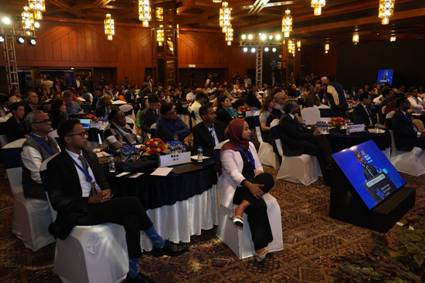
Mr. Kiran Gopal Vaska, Joint Secretary and Mission Director (ABDM), NHA delivered a keynote on “How Open Standards, Full-STAC and Digital Public Infrastructures Accelerate Digital Transformation.” He highlighted the importance of open protocols, modular architecture, and shared governance in building resilient health systems. He stated, “Open standards and the Full‑STAC approach are the backbone of interoperable health systems. When applied through digital public infrastructure, we move from fragmented point solutions to connected, citizen‑centric care. Health‑sector DPIs - rooted in ABHA, registries, consent, and FHIR – give countries a practical pathway to scale inclusion, strengthen governance, and unlock responsible innovation.”
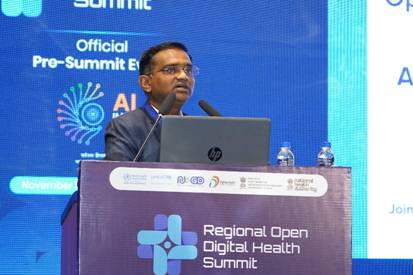
The summit also featured a special session on “Health Sector Digital Public Infrastructure – Use Cases and Regional Perspectives,” where Mr. Vaska elaborated on India’s experience with ABDM and the role of DPI in enabling real-world interoperability across programs and platforms.
The sessions covered a wide range of topics including Building with HL7 FHIR and WHO SMART Guidelines, GenAI for diagnostics, fraud detection, and multilingual communication, strengthening governance and legislative ecosystems for digital health, and advancing regional collaboration on surveillance data standards and personal health records.
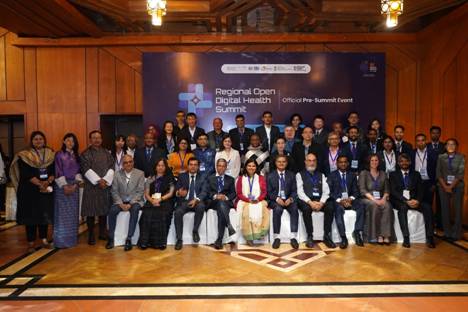
The summit also featured participation from other eminent dignitaries, such as Mr Nand Kumarum, CEO, NeGD; Dr. Alain Labrique, Director, Digital Health, WHO-HQ; Dr. Vinod Paul, Member (Health), NITI Aayog; Mr Abhishek Singh, CEO, India AI Mission; Dr. Rohini Srivathsa, National Technology Officer, Microsoft India; representatives from Sri Lanka, Nepal, Bhutan, Bangladesh, and Timor-Leste and senior representatives from WHO-SEARO, UNICEF and digital health leaders from across the SEAR Member States.
The Regional Open Digital Health Summit 2025 is expected to deliver actionable outcomes, including country-specific digital health roadmaps, enhanced technical capacity, and strengthened regional governance frameworks.
The summit builds on the momentum of the inaugural Open Digital Health Summit in Nairobi (2024) and reflects India’s commitment to advancing Universal Health Coverage (UHC) and the WHO Global Strategy on Digital Health.
***
SR
HFW- Regional Digital Open Health Summit/19th Nov 2025/1
(Release ID: 2191762)
Visitor Counter : 195